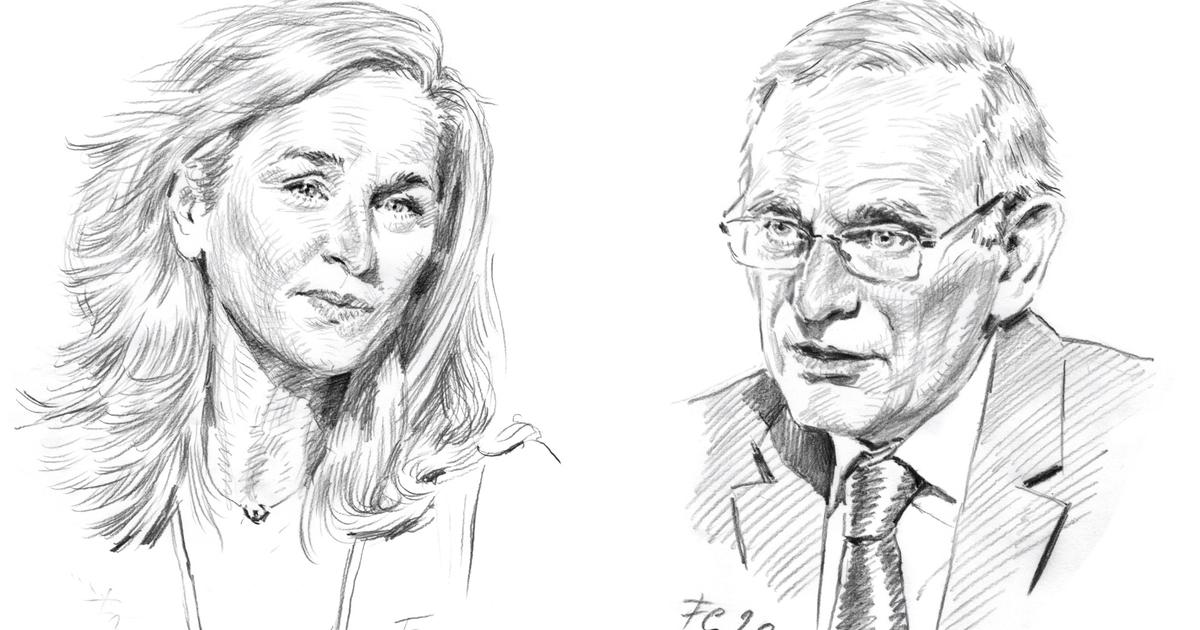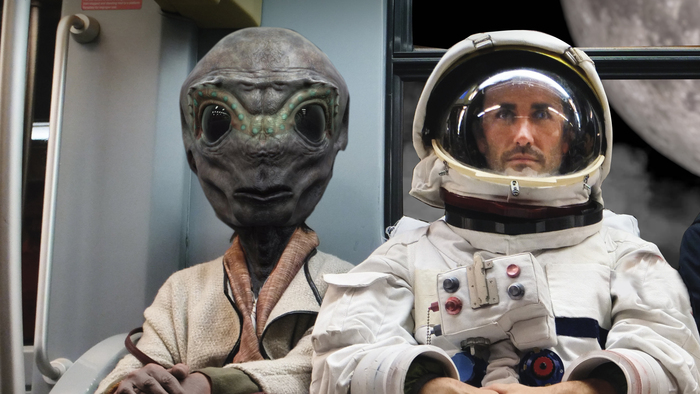The post in question on Facebook(Photo: screenshot, Facebook photo)
"Drag queen 'Kay Long' (also the name indicates a sexual character) makes a story hour in drag for children," reads the Facebook group "Children's Witness," adding a photo that definitely shows not Kay Long, but drag queen Suzy Boom, who reads the story to children during story time at the Tel Aviv Cinematheque, "the elephant that wanted to be the best." "This is not something children should be exposed to," the angry post continued. "Period. Exclamation point".
Setting aside for a moment the mistake of the drag queen; the fact that the name "Kay Long" also refers to the height of the character and not to any specific part of it, indicating the writer's blue head more than it; And the real deviation in this post, namely the assumption that an exclamation point can come after a period - this post is important, because it represents the perception of many Israelis towards drag queens and the deep hatred towards anyone who dares and dares to challenge dichotomous gender constructions, comparing LGBT people to pedophiles, child abductors and anything that will chill the souls of parents of preschoolers. "Downright abuse," wrote one commenter on the topic on my profile, "disgusting, confusing the sexuality of children at this age."
"You can't fix the world in one day"
But Lior (yes, just "Lior," he asks – like Madonna), the man behind Suzy Boom, isn't thrilled by the post circulating online or by the harsh reactions. "If I had paid attention to everything I was told, I wouldn't be where I am today," he says, with a calmness driven by long experience. Lior and Susie currently have a cumulative 55K followers on social networks, and that's where the negative comments flow as well. "When they write to me, 'Yuck, you disgusting,' 'You ugly,' 'You need hospitalization,' I write to them, 'Thank you for watching the video,'" he says. "They don't know how to deal with such a reaction." In the midst of the storm, he chooses to look at the glass half full: "As long as the writer of the post brought it to awareness and conversation, as far as I'm concerned, we played it big time. If there are people who have not been exposed to it until now, they have been exposed now. There were also kindergarten teachers who wrote to me that the concept actually sounded interesting to them. You can't fix the world in one day."
And maybe intolerance doesn't threaten him simply because he grew up in it. As a former yeshiva guy, he says, frightened statements about "gentiles" or black people or anyone else who is different in the landscape are not foreign to him. Nevertheless, he is not giving up on the task of expanding the circle of tolerance. Sometimes it also works for him. "There are a lot of people I knew who told me, 'Before we met, I thought about gays X and Zed, and you changed my perception,'" he says. "As long as you meet with a person and explain to them, you can show them things they don't notice."
Not excited. Lior (Photo courtesy)
One of the events that brought him such a meeting, he says, was his mother's 60th birthday, which was attended by family members and friends wearing headscarves. "I saw myself as a messenger," he says. "When I was finishing the show, someone came up to me and said, 'Wow, that was what lovely it was, it's like an adult clown.' I don't care how she says it, calling me a clown or a unicorn or a peacock. I know that as far as I'm concerned, I've changed their perception of drag shows. If I did that, if I brought them the world of drag and made it clear that it was a world of acting, and I was happy and laughing, then I did something."
Some might say that for adults it's fine, but for children - it's not appropriate. That drag brings sexuality, and that sexuality is inappropriate for the age of the audience.
"There was someone who told me this, and I asked her, 'Say, when I come to perform for children, do I come with a bulbul bow on my head?' Stand-up comedians who talk about sex will perform with it tomorrow on the children's channel? Why did the confused Yuval come up with a character? Why little Michal? Why did Nikki Golstein make the image of a girl? Why 'That's it'? Why Tal Friedman? Why is it okay and it is not? Because I look 'fine' and tight and polished? So Yuval Samo with a hideous silhouette and an ugly wig is fine."
Good point. And the kids, asking questions? Does it seem strange to them that you are a man in a woman's costume?
"Only adults ask. The children say: 'Yaaa - what a beautiful, what a dress, what hair!' They don't say, 'It's a boy disguised as a girl.' And to the question of adults, why come in drag, I answer: because it is beautiful, colorful and eye-catching. They always say, 'What is it, it's sexuality and it's confusing,' but kids don't pay attention to it at all. For adults, gay and drag equals sex and sexuality, because that's their stigma. They ignore the fact that I was a school teacher and that I have a master's degree at the university."
What does the research really say?
And despite the difficult picture he paints in front of the older audience, Lior, as usual, ends the interview with an optimistic message to the readers: "Love yourself. Walk with your truth and only in this way will you succeed. I always say, as someone who went from being a yeshiva guy to going through coming out to drag, everyone is a light in their own right."
Of course, Lior defends his identity and his right to continue performing for children, but, opponents will say, his opinion is obviously not objective. He is probably missing details, or ignoring the subconscious, unspoken damage caused to children in their encounters with drag queens. "It's a shame you're showing ignorance," one follower wrote to me, "and ignoring research on children's mental health." When I asked her what studies it was, as I would love a referral, she disappeared as if she hadn't been. So once and for all, what does the research really say?
You can't make a person think he's of a different gender
Chairman of the Psychiatric Association, Prof. Zvi Fishel (Photo: official website) "Our sense of gender identity is a very basic feeling that begins at a very early age, and in fact never ends, even if we reach a state of dementia."
"Our sense of gender identity is a very basic feeling that begins at a very early age, and in fact never ends, even if we reach a state of dementia," begins Dr. Zvi Fishel, chairman of the Israel Mental Health Council. According to him, even a person who has forgotten his name will not forget his gender. This knowledge is so deeply ingrained in us. Therefore, he says, "the idea that you can easily or even change a person's gender is wrong." You can't make a person think they're from a different gender or feel like they're from a different gender.
"What is possible is to make a person feel that the gender he feels belongs to is a mistake or a transgression, and then you cause an internal conflict between a person and his identity and society," he says. This conspiracy can cause serious damage: anxiety, depression, substance abuse and even suicidal attempts. "It's not a theoretical or moral issue," he stresses, "it's a matter of life or death. Severe mental distress from which we can save the person."
To explain these heavy implications, he enlists examples from worlds more familiar to us, those born in a sex-compatible gender experience. "When you go to the doctor as a nurse or vice versa, no, she doesn't feel good about it," he says. "Or let's take the former Soviet Union, for example, and other places where Jews were not allowed to express their Judaism. We want to be free to express the identity we feel. When there's tension that requires us to stifle our identity, it causes a lot of trouble."
Wide gender spectrum
It is interesting to compare gender identity to religious identity, since it has often been argued against LGBT people whose way of life harms the Jewish character of the State of Israel. Like queer or LGBT identity, Jewish identity is intangible, but felt beneficially from within. It too can be denied and forbidden, as history has shown, and the prohibition of this identity has also had serious consequences of harming lives. People have sacrificed themselves on the altar of this identity because it is experienced as an inseparable part of self-concept. "How we feel as Jews makes us happy when a Jew wins the Nobel Prize, for example, or makes us feel sad when a tragedy happens to a Jewish community," Dr. Had. "The same goes for gender."
That's when we realized that gender is not something you can change from the outside. What about sexual orientation? Is it possible to "educate" someone to be attracted differently from their natural inclination?
"Nope. We can prohibit someone from prohibiting someone from expressing their orientation through laws of religion and state, and even through messages they receive from society, but that doesn't change that tendency. There is a dangerous and criminal practice called conversion therapy, and it is criminal because it is its own – it gives the illusion that identity or sexual orientation can be converted, and it is dangerous because the person who can't cope with it feels wrong, and we know that the suicide rate in such treatments is very high. So take people who say, 'I went through conversion therapy and I succeeded': if you ask the patient if he is still attracted to men, yes, he is. So what did he succeed in? He succeeded in binding the urge, not making it disappear. But we as human beings in Western culture want to let a person realize himself, as long as he doesn't harm himself or anyone else."
There's the argument that it's becoming a trend to declare yourself LGBT.
"That's not true. What may be becoming a trend, or what society allows, is the legitimacy to express yourself on your entire gender spectrum. If once society unequivocally demanded that we be boys or girls, today we understand that this unequivocality is not suitable for the human soul."
Today we also know that the perception of gender depends on place, time and culture. If in the past pink was considered the color "of boys", while today "of girls"; If in some cultures trousers represent men's clothing while in others men wear skirts or galbias, which among us are a kind of dress - then gender is our invention, and changes in the creator's hand even without our intention. I mean, if your son has fun wearing dresses from time to time, that doesn't make him any less of a "boy," nor should it really confuse. Those who get confused are usually the adults, who project their confusion onto early childhood.
And even if it is, I wonder, since when is confusion such a bad thing? After all, all the years of forming our identity, in adolescence, are inherently confusing. So one year I dressed in black and heard Avril Levin, because I believed I was, and a year later I anointed myself in pink and started talking like a New Yorker pacazza, because I thought maybe I was it. One year I bought a plumber's cut, because it was the fashion, and the next year a high cut up to the bra line, because that too became fashion, because the beauty model is subject to changes about the same as gender models. The following year, by the way, I bought clothes that God understands what they are, to prove to myself that I despise the fashion industry. Confusion leads to searching, a search that is natural and exciting and harmless, even if sometimes exhausting or silly looking. If anything, sexual orientation is the easy part of identity – the one you don't need to invest in to form. Sexual identity is simply there with us, revealing itself to us at the moment when we are turned on by someone or someone or both.
As someone who grew up in a liberal Tel Aviv school, surrounded by gays, lesbians, transgenders and bisexuals, the LGBT presence around me never made me think I was attracted to a woman, just as meeting Mizrahim and boys did not make me think I was a Mizrahi man. No one said to me, "What, are you straight? embarrassing," and even if it is, obviously as rejected's humor. If Thelma Yellin, the bastion of liberalism and basic training for hipsters, does not "encourage LGBT people," it seems quite safe to say that such a thing does not exist in Israel, at all. Quite the opposite, yes. And it's dangerous.
Hands with pink and blue glitter (Photo: ShutterStock)
"Fear is out of conservatism"
"There are studies of children with transgender expression from an early age that show their mental health is good. We hardly see any percentage of regret, even for years. The percentage of regret is very low."
"Think one day you take a class and say, 'You all have to be doctors,'" Dr. Fishel says. "They don't let them be anything else. After all, this is unthinkable. Some people are suited to be doctors, some are disgusted with blood, care for another is foreign to them, or the intellectual skills required are not suitable for them. There are all kinds of people." The doctor gives this example shortly after I encountered a comment from a person online who claimed that he would rather have his child dream of becoming a doctor than a drag queen. Either way, I think in light of Dr. Fishel's words, we wouldn't want to impose every dream on our children. "Our judgment of the child should not rest on anything but harm," the doctor concludes. "When we tell them, 'It's okay and it's wrong,' it should rely solely on the degree of damage they're causing and nothing more."
What do we know from research on children growing up in a gender-diverse society?
"We know their development is normal. There are also studies of children with transgender expression from an early age, which show their mental health is good. We hardly see any percentage of regret, even for years. The percentage of regret is very low."
So what is the parents' fear? Why does the encounter of children with gender diversity cause such panic?
"The fear is from a conservatism, which says: 'As I grew up, so my children will grow up, my beliefs are the right ones, and I'm not even willing to test them and whether there are other beliefs that will show me that maybe I made a mistake and grew up in a kind of lie.' It's hard for us, and also with the thought that maybe if the child grows up in one way or another it will be hard for him in life. We feed on half-truths, so it's important to keep explaining to parents that forbidding a child to express himself can be very harmful, as opposed to allowing him – which is something healing and liberating. In order for our lives to be better, we need to expand our degrees of freedom in life as much as possible."
- health
- Parenting
- Child Health
Tags
- Transgender
- Children
- psychology









